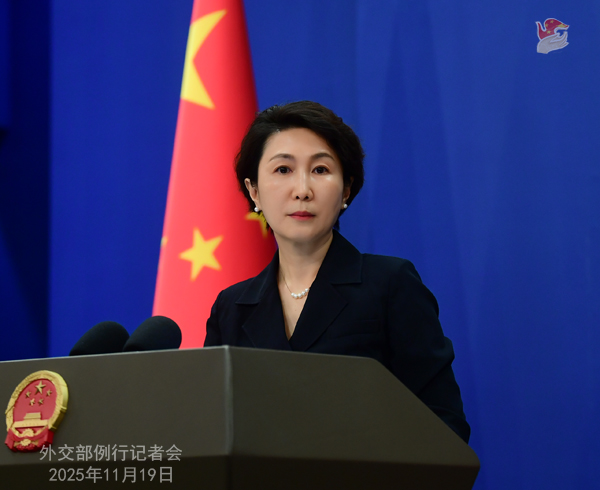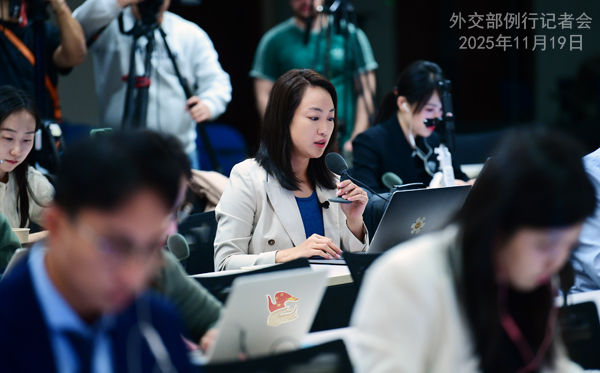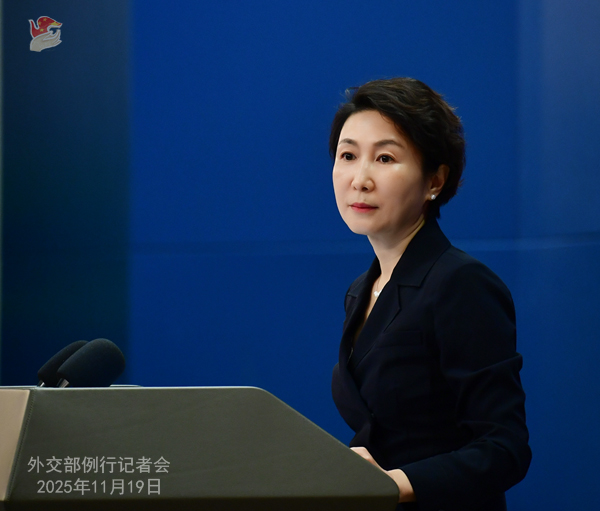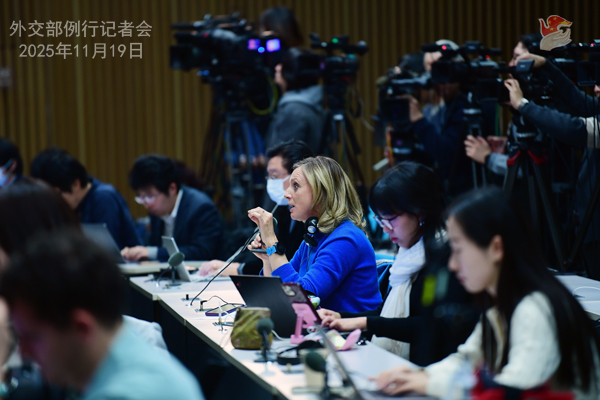
CCTV: Many analysts have pointed to the fact that Sanae Takaichi is the first Japanese prime minister to explicitly describe a hypothetical scenario concerning Taiwan as a “survival-threatening situation.” It implies that Japan could exercise the right of “collective self-defense” if such a situation occurs, which makes Japan’s armed intervention in the Taiwan Strait a possibility. That would be unacceptable to China given its red line. Do you agree with the view?
Mao Ning: The right of collective self-defense set forth in the UN Charter is created to safeguard the collective security of the international community and prevent the revival of fascist forces. Japan has been restricted from exercising this right since the end of World War II. The Potsdam Proclamation clearly states that Japan should not “re-arm.” Japan commits in its Constitution to “forever renouncing war and the threat or use of force as means of settling international disputes” and established the exclusively defense-oriented principle. Together they codified Japan’s obligations as a defeated country.
A brief look at history will show us that to use “survival-threatening situation” and “self-defense” as a pretext is a go-to tactic for Japanese militarism to launch aggression. In 1931, Japan called whether it could seize “Manchuria” as “survival-threatening,” and used that as a pretext to carry out the September 18th Incident and invaded and occupied Northeast China. Japan later claimed that to defend “the Greater East Asia Co-Prosperity Sphere” was an existential battle for Japan, enlarging its war of aggression to the entire Asia. Whether to attack Pearl Harbor was also deemed as “survival-threatening” to Japan, which ignited the Pacific War.
The alarm has been sounded. The historical tragedy must not repeat itself. As we mark the 80th anniversary of the victory of the Chinese People’s War of Resistance Against Japanese Aggression and the World Anti-Fascist War, the international community must guard against and firmly thwart any attempt of reviving militarism, jointly uphold the post-WWII international order and safeguard world peace.
Sky News: Yesterday, MI5 issued an official warning to British politicians about two LinkedIn accounts that it said were posing as “headhunters” but were in fact operating on behalf of the Chinese Ministry of State Security. Given the sheer regularity of these type of accusations recently, is it not quite far-fetched and perhaps even more damaging to bilateral relations between China and the UK for China to continue to maintain that the UK is just making it all up?
Mao Ning: China has stated its position more than once. China never interferes in other countries’ internal affairs and has absolutely no interest in the so-called “intelligence” of the UK Parliament. Time to stop those phantom allegations and the false projection.
China-Arab TV: Yesterday, Foreign Minister Wang Yi in his meeting with Ahmed Aboul Gheit, Secretary General of the League of Arab States, said the second China-Arab States Summit will be held next year. What steps is China taking for the preparation of the summit?
Mao Ning: In May 2024, President Xi Jinping attended the opening ceremony of the 10th Ministerial Conference of the China-Arab States Cooperation Forum and delivered a keynote speech. President Xi Jinping in the speech announced China will host the second China-Arab States Summit in China in 2026. Yesterday, Foreign Minister Wang Yi and Secretary General of the Arab League Ahmed Aboul Gheit had an in-depth exchange of views on jointly making preparations for the summit. The preparation work is in orderly progress.

CGTN: On November 18 local time, the 80th session of the UN General Assembly deliberated on the reform of the Security Council. The Chinese representative explicitly pointed out in his remarks that Japan “is totally unqualified to seek a permanent seat on the Security Council.” What is your comment?
Mao Ning: According to the UN Charter, the Security Council bears primary responsibility for the maintenance of international peace and security. Japan waged a war of aggression during the Second World War, inflicting profound sufferings on the people of Asia and the world. To this day, Japan still has not fully repented for its war crimes. Some in Japan continue to advocate a wrong perception of World War II history, and they still pay tribute to the Yasukuni Shrine, and distort, deny and even whitewash Japan’s history of aggression. The erroneous remarks of Japanese Prime Minister Sanae Takaichi on Taiwan grossly interfere in China’s internal affairs, trample on international law and basic norms in international relations, and challenge the post-WWII international order. A country like this is in no position to take up the responsibility for maintaining international peace and security, and is unfit for permanent membership of the Security Council.
AFP: Prosecutors in Taiwan charged seven people, including a person from Chinese mainland, on Tuesday with violating national security after they allegedly collected military secrets for Chinese mainland. What is the Foreign Ministry’s comment on this?
Mao Ning: This is not related to foreign affairs.
NHK: We’ve learned that China has notified Japan it will suspend the imports of Japanese aquatic products. Can you share the details and the reason for this?
Mao Ning: Japan made a commitment to fulfill the regulatory responsibility of guaranteeing the quality and safety of its aquatic products exported to China. This is the prerequisite for China’s import of Japanese aquatic products. However, Japan has so far been unable to provide the technical materials under its commitment.
Let me reiterate that because of Japanese Prime Minister Sanae Takaichi’s egregious moves and erroneous remarks concerning Taiwan and other major issues of principle, there has been strong outrage and condemnation from the Chinese people. Under current circumstances, there will be no market for Japanese aquatic products even if they enter China.
Beijing Daily: The 24th Meeting of the Council of Heads of Government of Member States of the Shanghai Cooperation Organization (SCO) was held in Moscow, and Premier Li Qiang attended the meeting. Could you share more information and the outcomes of the meeting?
Mao Ning: The Meeting of the Council of Heads of Government of Member States of the SCO held yesterday was a full success. Leaders of participating countries had an in-depth discussion and reached important common understandings on implementing the outcomes of the SCO Summit in Tianjin, deepening cooperation in various fields, and strengthening institution-building of the organization.
Premier Li Qiang said that as an important player in building and reforming the global governance system, the SCO is equipped and capable of jointly implementing the Global Governance Initiative. The SCO should focus on the key areas of development and security to build an open and inclusive world economy and promote universal security and lasting peace. The SCO should achieve sustainable development by fostering and developing new drivers and promoting green and low-carbon transition. China stands ready to work with all parties to further enhance the SCO’s cohesion, capacity for action, and influence, and continuously make the SCO better and stronger.
Leaders of participating countries spoke highly of the contributions made at the SCO Summit to the high-quality development of the SCO. They agreed to continue following the guidance of the Shanghai Spirit, actively promote cooperation on security, trade, finance and connectivity and people-to-people and cultural exchanges, among other fields, and contribute to promoting peace and development in the region and beyond and reforming and building the global governance system.
Nippon TV: Regarding yesterday’s meeting between Japan and China, Japan has requested China for explanation not informing Japan that there is a media shooting opportunity after the meeting. What is China’s comment towards this?
Mao Ning: China did not arrange media organizations to photograph or shoot videos there. I actually noticed that most of the reporters at the scene were from Japanese media outlets.

RIA Novosti: Yesterday, Russian President Putin said that the visa-free policy toward Chinese nationals will take effect in the near future. What is the Foreign Ministry’s comment? Will the number of Chinese tourists to Russia increase?
Mao Ning: China attaches great importance to facilitating cross-border travel between the Chinese and Russian people. China and Russia are each other’s largest neighbors. Mutual visa exemption will further strengthen people-to-people and cultural exchanges and serve the common interests of the two peoples.
Reuters: Yesterday, Japan’s Chief Cabinet Secretary Kihara when asked about whether Japan plans to retract Prime Minister Takaichi’s remarks about Taiwan responded by saying those remarks were in line with Japan’s long-standing views. Do you have any comment on this?
Mao Ning: Let me stress that Japanese Prime Minister Sanae Takaichi’s erroneous remarks on Taiwan have fundamentally eroded the political foundation of China-Japan relations and triggered strong outrage and condemnation from the Chinese people. China seriously urges Japan to retract the erroneous remarks, stop making provocations on issues concerning China, take practical steps to admit and correct the wrongdoing, and uphold the political foundation of China-Japan relations. If Japan refuses to retract them or even continue to pursue the wrong course, China will have to take strong and resolute countermeasures and all consequences arising therefrom will be borne by Japan.
The Paper: It’s reported that U.S. Secretary of War Pete Hegseth unveiled Operation Southern Spear that aims to remove “narco-terrorists” from the Western Hemisphere. The U.S. State Department this week announced to designate Cartel de los Soles “headed by Nicolás Maduro” as a Foreign Terrorist Organization, effective November 24, 2025. The U.S. also said it would not rule out sending U.S. troops into Venezuela. What’s China’s comment?
Mao Ning: China firmly supports the Proclamation of Latin America and the Caribbean as a Zone of Peace released by the Community of Latin American and Caribbean States in 2014. China opposes any moves that violate the purposes and principles of the UN Charter and other countries’ sovereignty and security, and the interference of external forces in Venezuela’s internal affairs under any pretext. We hope the U.S. will engage in normal law enforcement and judicial cooperation through bilateral and multilateral legal frameworks and choose the course of action that is conducive to peace and stability in Latin America and the Caribbean region.
BBC: Just to follow up on the previous question, you said if Prime Minister Takaichi did not retract her comments, China would take further countermeasures. What further financial and diplomatic pressure is China threatening?
Mao Ning: I just elaborated on China’s position. Japanese Prime Minister Sanae Takaichi’s erroneous remarks on Taiwan damaged the political foundation of China-Japan relations. China has every reason to take countermeasures. Japan needs to, first and foremost, retract the erroneous remarks and take practical steps to redress the wrongdoing. Otherwise, China will have to take further measures.
